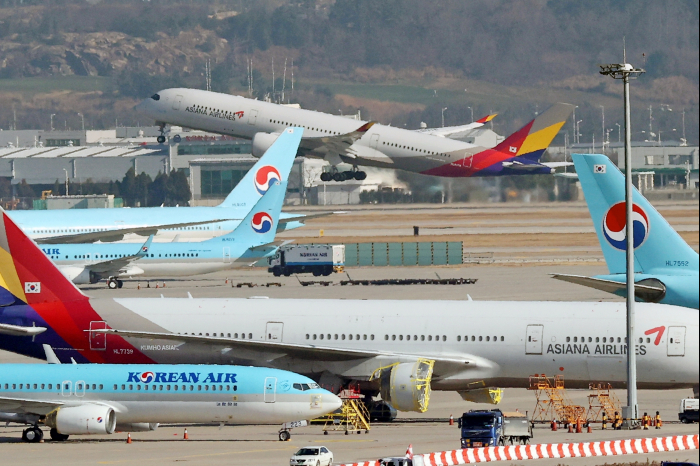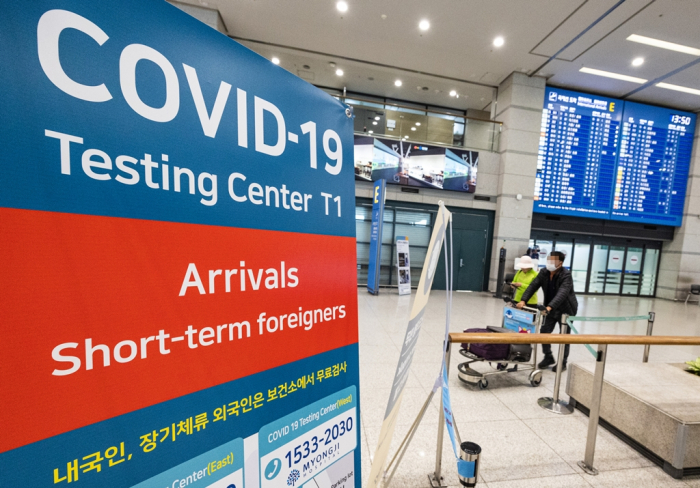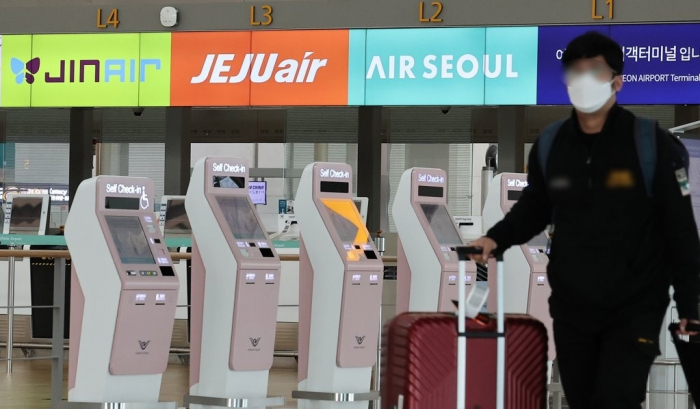Airlines
Korea-China air flights set to rise with Beijing’s eased zero-COVID policy
The reopening of borders is an opportunity for Korea’s full-service and budget carriers to recover from the pandemic slowdown
By Dec 22, 2022 (Gmt+09:00)
3
Min read
Most Read
LG Chem to sell water filter business to Glenwood PE for $692 million


Kyobo Life poised to buy Japan’s SBI Group-owned savings bank


KT&G eyes overseas M&A after rejecting activist fund's offer


StockX in merger talks with Naver’s online reseller Kream


Mirae Asset to be named Korea Post’s core real estate fund operator



Air flights between South Korea and China are set to rise significantly next year with the Chinese government issuing new guidelines easing its strict zero-COVID-19 policy, including relaxed travel restrictions.
According to Korea’s transport ministry and industry officials on Thursday, the aviation authorities of the two countries have agreed to increase the number of weekly flights between their major cities by 16 to 50.
Given that the flights are round-trip, a total of 100 airplanes will be flying weekly on major China-Korea routes.
At the height of the pandemic, such flights had plummeted to as low as three times a week from the pre-pandemic level of 500. As COVID infections spread quickly across China, its government imposed a strict “one airline, one route” policy for foreign carriers.
With its economy worsening faster than expected, however, the Chinese government earlier this month announced new guidelines, relaxing test requirements and travel restrictions.
The guidelines represent a significant shift from the strict policy that China has maintained for the past three years, which involved quashing outbreaks through mass testing, stringent lockdowns and border closures.

POSSIBLE LIFT OF HALLYU BAN
Together with the eased rules, recent indications that Beijing might ease its ban on Korean pop culture and dramas, collectively known as Hallyu or Korean Wave, will likely help the Korean aviation industry recover from the doldrums, industry officials said.
Korean airline companies – full-service carriers and budget carriers alike – are adding new routes and resuming international flights with the reopening of borders.
Korean Air Lines Co., the country’s flag carrier, is gearing up for a full recovery of its seven routes from Incheon to Chinese cities – Tianjin, Guangzhou, Shenyang, Dalian, Shanghai (Pudong), Nanjing and Qingdao.
Korean Air (KAL) said it recently increased its flights to Shenyang and Tianjin to twice a week from just once earlier.
KAL’s crosstown rival Asiana Airlines Inc., which operates routes from Incheon to Shanghai, Shenzhen, Hangzhou, Chengdu, Changchun, Beijing, Nanjing and Harbin, said it is considering further increasing its flights to China’s major cities.

BUDGET AIRLINES ALSO RESUME FLIGHTS
Korea’s low-cost carriers (LCCs), including Jeju Air Co., T’Way Co., Jin Air Co. and Air Busan Co. – also plan to increase their flights to China.
Jeju Air has raised its Chinese route flights to four times a week. While flights on its Incheon-Weihai route were increased to twice a week, the company resumed its flights to the Chinese cities of Yanji and Harbin.
Jin Air, the budget airline unit of Korean Air, is currently running the Jeju-Xian route exclusively.
Air Busan, which operates the Incheon-Qingdao and the Busan-Qingdao routes, is widely expected to resume its Busan-Yanji route early next year, industry watchers said.
T’Way flies from the southern Korean city of Daegu to China’s Shenyang, Wuhan and Yanji.
China accounts for about a fifth of Korean budget carriers’ sales revenue, industry data showed.
Those airlines, which mainly focus on short- to medium-haul flights, generate about 80% of their sales on routes from Korea’s neighboring countries, including China.
Write to Seo-woo Jang at suwu@hankyung.com
In-Soo Nam edited this article.
More to Read
-
 AirlinesForeign airlines gnaw at Korean LCCs on international flight routes
AirlinesForeign airlines gnaw at Korean LCCs on international flight routesDec 20, 2022 (Gmt+09:00)
3 Min read -
 AirlinesKorean LCCs resume flights to Taipei after nearly 3 years
AirlinesKorean LCCs resume flights to Taipei after nearly 3 yearsDec 05, 2022 (Gmt+09:00)
1 Min read -
 AirlinesS. Korea's T'way Air to resume Incheon-Chiang Mai route
AirlinesS. Korea's T'way Air to resume Incheon-Chiang Mai routeNov 17, 2022 (Gmt+09:00)
1 Min read -
 AirlinesKorean LCCs’ international flight recovery remains slow
AirlinesKorean LCCs’ international flight recovery remains slowJul 15, 2022 (Gmt+09:00)
2 Min read -
 Mergers & AcquisitionsKorean Air vows to get nod from all antitrust bodies for Asiana merger
Mergers & AcquisitionsKorean Air vows to get nod from all antitrust bodies for Asiana mergerMay 23, 2022 (Gmt+09:00)
2 Min read
Comment 0
LOG IN


